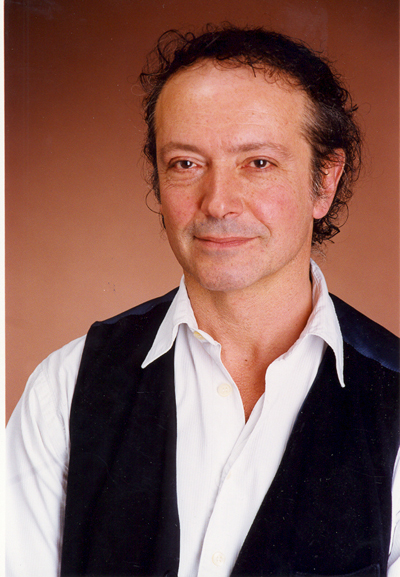Iván Markó
Iván Markó (1947 - 2022 )
Ballet-dancer,  choreographer. He was born on 29. March 1947 in Balassagyarmat. His father was Pál Markó, and his mother was Anna Fleischer. The house where he was born now is the so-called Civitas Fortissima square, and at its courtyard now stands the statue of Párkányi Péter, which is a hommage toward the heroes of the city, who helped to fight off the Czech Army in January, 1919. When he was an elementary grade student he spent his vacations at his relatives, the Hegyi family, who resided in Balassagyarmat. He finished his studies at the National Ballet Institution. From 1967 he is a member of the Hungarian National Opera. Thanks to his lyric makeup and his sophisticated technique he soon finds himself dancing the main roles of many romantic and classic ballet. In 1972 he joins Maurice Béjart's famous group in Brussels, the so called Ballet of the 20th Century (Ballet du XXme Siècle), and his debut is the main role of the Firebird. From that moment on Markó Iván becomes one of the lead dancers of this world famous group. He was selected into the ten best dancers in the world in 1974 by the critics.
choreographer. He was born on 29. March 1947 in Balassagyarmat. His father was Pál Markó, and his mother was Anna Fleischer. The house where he was born now is the so-called Civitas Fortissima square, and at its courtyard now stands the statue of Párkányi Péter, which is a hommage toward the heroes of the city, who helped to fight off the Czech Army in January, 1919. When he was an elementary grade student he spent his vacations at his relatives, the Hegyi family, who resided in Balassagyarmat. He finished his studies at the National Ballet Institution. From 1967 he is a member of the Hungarian National Opera. Thanks to his lyric makeup and his sophisticated technique he soon finds himself dancing the main roles of many romantic and classic ballet. In 1972 he joins Maurice Béjart's famous group in Brussels, the so called Ballet of the 20th Century (Ballet du XXme Siècle), and his debut is the main role of the Firebird. From that moment on Markó Iván becomes one of the lead dancers of this world famous group. He was selected into the ten best dancers in the world in 1974 by the critics.
In 1979 he returns to Hungary, and he founds his own company at Győr. He chooses 15 graduating student from the National Ballet Institution to start with.
In fact he begins working with them one year before he selects them. He finishes his first choreography, and it becomes the exam for the students he later chooses. It is called The loved ones of the Sun, and it is composed to the rhythm of Carl Orff's: Carmina Burana's 10th movement. This made the event historical, because the audience saw the first choreography of a new director, and the first show of a new group.
This first show was followed by many, and the test of time proved, that Marko Iván is also a very talented and outstanding choreographer.
Between 1972 and 1991 he participated in 80 tours to different foreign countries all over the world. He was a guest choreographer at famous places like The Paris Opera (Opera de Paris), La Scala in Milan (Teatro alla Scala) and the Rubin Academy (The Jerusalem Academy of Music and Dance) in Jerusalem. He also participated in the event called The New Theatre Festival in Baltimore. His version of the Miraculous Mandarin was a huge success, and the critics said it was the most influential performance at the festival. Iván Markó was the director and main choreographer of The Bayreuth Festival (Bayreuther Festspiele) for 17 years.
From 1992 he was a guest choreographer in different European and transatlantic countries. In 1996 he founded the Hungarian festival Ballet group. As an art director and a choreographer he always tried to speak to his audience through his shows, his performances were always full of emotions and also were very spectacular.
Awards :
1981. Worthy Artist-award (A highly appriciated award in Hungary.)
1983. Kossuth Award
1994., 1999. Loyalty Award of the Bayreuth Festival
2005. Becomes a member of the "Company of Immortals"
2006. Becomes freeman of Balassagyarmat
2007. Jerusalem Award
2007. The Medium Cross of the Hungarian Republic
Main roles : Albert (Lavrovsky: Giselle), Prince (Messerer: Swan Lake), lead role (Seregi: The Wooden Prince), Amintas (Seregi: Sylvia), Firebird (Béjart: Firebird), Opus 5 (Béjart), Séraphita (Béjart), 9th Symphony (Béjart), Nijinsky, clown of God (Béjart), Petrushka (Béjart), The poet (Markó: The moment of truth), lead role (Markó: The Miraculous Mandarin), Jesus (Markó I.: Jesus, Son of Man), Don Juan, Faust, Mr. K/M (Markó: Don Juan's shadow above us), The writer (Markó: Bulgakov and the others), Jacob (Markó: Joseph and his brothers), Inquisitor, Nazi officer, jewish mother (Markó: Yiddische Mame)
Most important choreographies : The loved ones of the Sun (1979), The samurai (1980), The Wonderful Mandarin (1981), Taboos and fetishes (1982), Smouldering Planets (1983), Bolero (1983), Chairs (1989), Joseph and his brothers (1999), Viva Verdi! (2001), Romeo and Juliet in Jerusalem (2006), The Human Anthem (2007)
X X X
Acknowledgement to those, who helped this article
Vas Ágnes and Ács Zsuzsanna
Librarians, we thank them hereby for the information they made available to us. (The webpage of the local Madách Imre Library: http://www.vkbalassa.hu)



